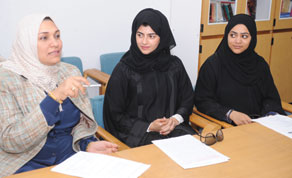 |
| Dr al-Faham of Qatar University’s Biological and Environmental Sciences Department with students Mariam Abdullah and Muna Haider |
The Qatar University (QU) event, titled “Mangrove Habitats: Functioning, Management and Sustainable Development”, is intended to draw attention to the importance of mangroves and to bring together scientists, academics, researchers from Qatar, the Gulf region, and internationally.
“The participants will present and discuss papers on mangrove habitats, best practices and management experiences, and make recommendations for strategies towards protection and conservation,” Biological and Environmental Sciences Department head Dr Hamda al-Naemi said.
Globally, about 56 species of mangrove cover approximately 150,000sq km of tropical and subtropical coastal areas, she pointed out.
She said that the species Avicennia marina dominates the Arabian Gulf.
In Qatar, it is found in the northeast coast.
Dr Al-Naemi stressed that mangroves are seriously undervalued although they are known as a major carbon reservoir and among the highest of any forest type.
“The symposium will highlight the importance of mangroves in improving water quality by functioning as a biological filter, protecting soil erosion and providing refuge for on-shore and offshore marine life,” she said.
The participants will also address the causes of the degradation of these ecosystems – human activity such as house building, road construction, littering, petroleum contamination, overgrazing, and cars and vehicles being driven over the mangroves.
Over 200 participants are expected to attend.
Keynote speaker Dr Uta Berger from Germany’s Dresden University of Technology will present on “Simple forests follow simple principles of succession: Understanding the dynamics of complex ecological systems by means of simulation models”.
Expert papers will also be presented by Dr Andrew Sweetman (of Norway’s University of Bergen), Dr Martin Skov (of Britain’s Bangor University), Dr Fares Howari (of Abu Dhabi University), Dr Assad Thukair (of King Fahd University of Petroleum & Minerals, Saudi Arabia), Dr Jassim al-Khayat (of Qatar University), Dr Habibah Saud al-Manaie (of Kuwait Institute for Scientific Research) and Dr Thuraya al-Mansoori (of University of Bahrain).
The papers will address such topics as mangrove restoration, remote sensing techniques in mangrove identification, comparison of fauna of natural and replanted mangroves, coastal rehabilitation through sustainable management of mangroves, and assessing environmental stress on mangroves.
Additionally, a workshop on “The mangrove of the Gulf countries: Current status and initiatives for collaborative research towards sustainable management” will be conducted by Dr Yousria al-Faham (assistant professor at Qatar University’s Biological and Environmental Sciences Department).
An important factor of the event is that it is a class assignment for the department’s students. They will also participate in the poster exhibition and present 17 posters.
Fourth-year student Muna Haider said the symposium is a perfect opportunity to get a better understanding of the environmental issues in Qatar and the Gulf region.
Another fourth-year student, Mariam Abdullah, added that the experience and knowledge from the event will be shared within the students’ social network in order to educate people and create awareness on the importance of mangroves and how it relates to Qatar.
The programme agenda will also include a field trip to the mangroves tomorrow.

